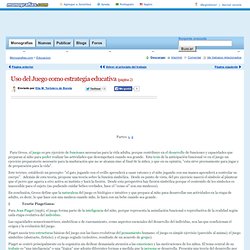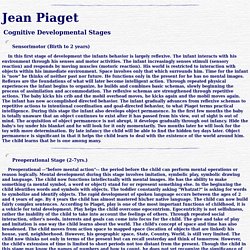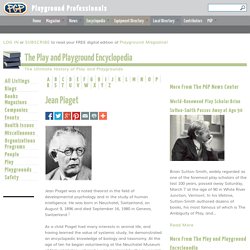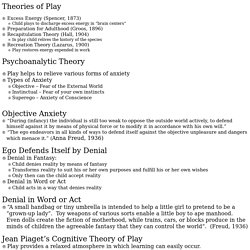

Www.uruguaypiensa.org.uy/imgnoticias/756.pdf. Uso del Juego como estrategia educativa (página 2) - Monografias.com. Para Groos, el juego es pre ejercicio de funciones necesarias para la vida adulta, porque contribuye en el desarrollo de funciones y capacidades que preparan al niño para poder realizar las actividades que desempeñará cuando sea grande.

Esta tesis de la anticipación funcional ve en el juego un ejercicio preparatorio necesario para la maduración que no se alcanza sino al final de la niñez, y que en su opinión, "esta sirve precisamente para jugar y de preparación para la vida". Este teórico, estableció un precepto: "el gato jugando con el ovillo aprenderá a cazar ratones y el niño jugando con sus manos aprenderá a controlar su cuerpo". Además de esta teoría, propone una teoría sobre la función simbólica. Desde su punto de vista, del pre ejercicio nacerá el símbolo al plantear que el perro que agarra a otro activa su instinto y hará la ficción. . § Teoría Piagetiana: § Teoría Vygotskyana: The Influence of Piaget and Vygotsky on Everyday Elementary Classroom Teaching and Learning. Keywords: cognitive developmental theory, guided learning, kinesthetic learning, sociocultural theory Introduction Despite their academic findings taking place more than half of a century ago, the influence of educational researchers Jean Piaget and Lev Vygotskycan be found in school classrooms around the world today.

Let's look at how seminal theories provided by Piaget and Vygotsky are not only complementary but how they are commonly used in classroom teaching and learning. Cognitive Developmental Theory Piaget (1985) developed cognitive developmental theory which proposes that children actively construct knowledge as they manipulate and explore their world. Sociocultural Theory Lev Vygotsky’s sociocultural theory focuses on culture, the values, beliefs, customs and skills of a social group and how it is transmitted to the next generation(Vygotsky, 1978). The Complementariness of Piagetian and Vygotskian Thinking How have these theories affected curricula and pedagogy in Elementaryschools? Jean Piaget Cognitive Developmental Stages. Jean Piaget Cognitive Developmental Stages In this first stage of development the infants behavior is largely reflexive.

The infant interacts with his environment through his senses and motor activities. The infant increasingly senses stimuli (sensory reaction) and responds by moving muscles (motoric reaction). His world is restricted to interaction with objects within his immediate environment. Preoperational --"before mental action"-- the period before the child can perform mental operations or reason logically. A major cognitive shift takes place between the preschool and school years, the child gradually moves toward the performance of mental operation. The adolescent's cognitive development has moved from knowledge through physical action to symbolic pre-logical intuitive thought, to formal logical patterns of reasoning about abstract ideas and problems. Jean Piaget. Jean Piaget was a noted theorist in the field of developmental psychology and in the study of human intelligence.

He was born in Neuchatel, Switzerland, on August 9, 1896 and died September 16, 1980 in Geneva, Switzerland. As a child Piaget had many interests in animal life, and having learned the value of systemic study, he demonstrated an encyclopedic knowledge of biology and taxonomy. At the age of ten he began volunteering at the Neuchatel Museum of Natural History, where he was mentored by the museum’s director, naturalist Paul Godet, who encouraged his interests and made Piaget his assistant and apprentice. Piaget published his first paper on the albino sparrow at the age of ten and had earned his PH.D. in science from the University of Neuchatel by the age of twenty-two with his doctoral thesis on the classification of mollusks. Theories of Play. ® Excess Energy (Spencer, 1873) ® Child plays to discharge excess energy in “brain centers” ® Preparation for Adulthood (Groos, 1896) ® Recapitulation Theory (Hall, 1904) ® In play child relives the history of the species ® Recreation Theory (Lazarus, 1900) ® Play restores energy expended in work ® Play helps to relieve various forms of anxiety.

Jcpe.wmwikis.net/file/view/blake.pdf. Www.iccp-play.org/documents/brno/trageton.pdf. Piaget's Construction of the Child's Reality - Susan Sugarman - Google Books. Ccl.northwestern.edu/papers/Abrahamson_Wilensky_JPS20.pdf. Vygotsky & Piaget flashcards. JSTOR: Oxford Review of Education, Vol. 10, No. 3 (1984), pp. 271-274. Piaget Classroom Activities. Funderstanding: Education, Curriculum and Learning Resources. The early years of life are full of colors, sounds, experiences and experiments.

Children learn through their senses along with interactions with others. Jean Piaget, a Swiss born biologist and psychologist, felt that every interaction establishes cognitive structure in children. Sure makes you think twice about using that cookie as a bribe for some good behavior, right? Piaget and the Child Developmental Model Piaget came to his conclusions after spending time observing children while they were learning and playing. Sensorimotor stage: from birth to 2 years of age. Encouraging the Piaget Model Through these stages, there are several ways adults can positively influence learning through Piaget’s concepts.
Sensorimotor – During this stage, the child is limited by her abilities. Preocupational – Speech is one of the main advancements during this stage, with language taking up a large part of development. Concrete operational – A child is ready for challenges at this stage. Los 8 bosques más bonitos del mundo - Yahoo Noticias España.